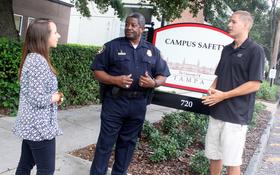Ever since tragedy hit Virginia Tech in 2007, college campuses have been examining ways to make their schools safer for students and faculty. The more recent shootings in Arizona have further illustrated the need for intervention with disturbed students who could pose a potential danger to themselves or others. However, identifying the problem and finding a reasonable solution are two very different things. We will take a look at how some colleges are learning lessons from the Arizona tragedy and using what they learned to enhance safety on their campuses.
About Jared Loughner
Jared Loughner was a student at Pima Community College in Tucson. The college became concerned about some of Loughner's erratic behavior and eventually suspended him from the school. A few months after Loughner's suspension, he opened fire on a shopping mall in Arizona, wounding 13 and killing six people, including U.S. Rep. Gabrielle Giffords.
According to a report at Google News, officials at Pima Community College released 51 pages of police documents on Loughner, depicting him as "creepy," "very hostile," and "having difficulty understanding what he did wrong in the classroom."
When Loughner released a YouTube video that called the college a "scam" and associated it with genocide, school officials told Loughner and his parents that he was no longer able to return to his classes. He would also need to obtain a report from a psychiatrist attesting to his mental health before coming back to the school campus again. Loughner never returned to Pima.
In this video, CNN's Randi Kaye retraces the footsteps of Arizona shooting suspect Jared Loughner on the day of the tragedy.
Using the Example
Many colleges across the country began instituting new prevention policies for potentially troubled students after the Virginia Tech tragedy. An article at Star Tribune reports that before Virginia Tech, about 20 schools had intervention teams that tracked students with possible issues. Since that time, about 1,600 schools have adopted some student intervention policy.
One of the colleges with an intervention team is Pima Community College, which may be why Loughner was identified and suspended from the school in a timely fashion. The school will not say whether their team had flagged Loughner.
Prevalence of Problems at Community Colleges?
Community colleges are in a unique situation, as they can potentially bring in more unstable and mentally ill students because of their open-door policies, according to the LA Times. An Associated Press report cites statistics from an American College Counseling Association survey that show 44% of students who visit college counseling centers today have severe psychological disorders. Currently, one in every four students is on medication for a mental issue, as opposed to just 17% in 2000. With more students requiring additional assistance and community college budgets already stressed to the limit, some schools are trying to take matters into their own hands.
In this video from ABC News, multiple eyewitnesses call 911, help the wounded, and tackle the alleged gunman.
North Carolina's Admission Rule
North Carolina's community college board is progressing with a policy to refuse admission to any student who poses an "imminent and significant threat," according to WSOCTV. Megan Hoenk, the board spokesman, told the news station, "[Our policy committee] wanted to provide colleges with the tools they needed to protect their students."
However, many in the community are concerned that the language in the policy is vague and difficult to define clearly. This could put students at a disadvantage in terms of admission or an appeals process if admission is denied on these grounds. Ellis Fields, director of the Mental Health Association of Central Carolinas, told WSOCTV that she understands the reasoning behind the policy but is concerned about the policy itself. Fields said, "It concerns me because I think the wording is very vague. It begs the question of who's going to determine and define each of those words?"
Gun Bill in Arizona
Arizona legislators are considering a bill that would allow faculty and administrators on college campuses to carry concealed weapons. Rep. Jack Harper, R-Surprise, introduced the bill, after an Arizona State professor told him he no longer felt safe on campus, according to a report at AZCentral.com. Harper filed his bill before the Tucson shooting, but the legislation is getting even more attention after the fact.
Not everyone is in favor of allowing guns on a college campus in Arizona. ASU professor Darryl Hattenhauer, who has undergone weapons training, told AZCentral.com, "There is a statistical correlation between those societies that have fewer guns and those that have fewer crimes." He called the bill "ludicrous," and said the state should focus more on prevention, like placing undercover police officers in classrooms.
In this video from CNN, President Obama comments on the shooting in Arizona that left six dead and several injured, including Rep. Gabrielle Giffords.
Safety is a major concern on community college campuses today, and recent events have highlighted that concern. However, it remains to be seen if a consensus can be reached on just how to achieve a safer campus overall.
Questions? Contact us on Facebook. @communitycollegereview















